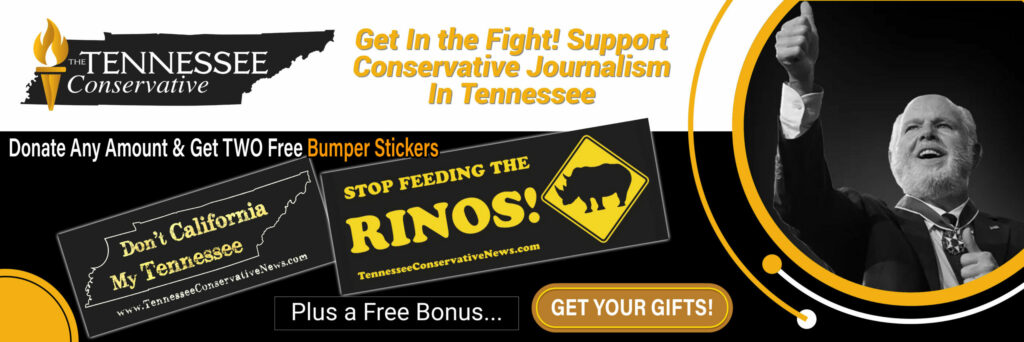Closing arguments made in final days of Tennessee political corruption trial.
Image: Glen Casada’s defense team, including attorneys Ed Yarbrough, front center, and Johnathan Farmer, front right, walk out of the Fred D. Thompson Federal Courthouse. Image Credit: John Partipilo/Tennessee Lookout
By Sam Stockard [The Tennessee Lookout -CC BY-NC-ND 4.0] –
Defense attorneys tried to poke holes Monday in the corruption case against a former Tennessee House speaker and his ex-top aide, saying they were starting a small political consulting company and simply made mistakes.
During closing arguments, Nashville defense attorney Ed Yarbrough said federal prosecutors “twisted” the law to create a litany of charges against his client, Glen Casada.
Casada and his former chief of staff, Cade Cothren, are charged with 19 counts of bribery, kickbacks, fraud and money laundering connected to a secretive political vendor named Phoenix Solutions that operated from late 2019 to mid-2020.

Casada and Cothren are accused of hiding Cothren’s role in Phoenix Solutions after he resigned from his state job in early 2019 in the midst of a racist and sexist texting scandal. Former Rep. Robin Smith of Hixson pleaded guilty to one charge three years ago and testified against the pair in hopes of getting a lesser sentence.
Yarbrough cast doubt on whether the federal charges filed against his client and Cothren even amounted to criminal activity, instead saying they were “amateur” business people who made “rookie errors.”
Cothren and Casada declined to testify in the trial as it entered the fourth week.
Yarbrough argued that the missing “elephant in the room” was House Speaker Cameron Sexton, who didn’t testify either.
Testimony showed he had authority to approve vendors for the state’s postage and printing program in which House members receive $3,000 annually for constituent mailers but allowed Phoenix Solutions to do work even though the state slow-walked payments to the company and consulting businesses owned by Casada and Smith.
The defense also said a state handbook on the program didn’t have an official vendor approval process, only the payment protocol handled by former Legislative Administration Director Connie Ridley and ultimate approval by the Speaker’s office.
“How can you possibly convict anybody when you don’t know what Cameron Sexton would have said?” Yarbrough asked the jury.
Sexton was expected to be one of the prosecution’s star witnesses, along with Smith, and the defense subpoenaed him to testify, but neither side called him to the stand.
Cothren had said previously that he helped Sexton win the Speaker’s election after Casada stepped down in 2019, citing a list of text messages and phone calls. But those weren’t among the main pieces of evidence in the trial.
Assistant U.S. Attorney Blake Ellison made a portion of the prosecution’s closing argument, saying Cothren came up with a private business and used two state legislators to tap into state funds, which were described as “low-hanging fruit.”
“All of them lied,” Ellison said, and covered up Cothren’s role to receive kickbacks.
In audio of Casada’s interview with FBI agents the morning they raided his Franklin condo five years ago, Casada told agents that Cothren couldn’t “deal” because Speaker Sexton didn’t like him. The inadvertent playing of that unreacted recording nearly led to a mistrial last week.
Testimony from former Rep. Patsy Hazlewood and Reps. Jay Reedy and Esther Helton-Haynes showed they wouldn’t have allowed Phoenix Solutions to handle their mailers if they had known Cothren was involved because of his role in the scandal.
Ellison told jurors the defendants forged an agreement with Smith to start Phoenix Solutions, which was set up through New Mexico’s secretary of state, and to keep Cothren’s part in the company secret because he was “politically radioactive.”
“They were eager to make an extra buck,” Ellison said, adding Smith and Casada were to use their positions as lawmakers to drum up business and then pressure Ridley to make payments.

Amid questions about Phoenix Solutions, the Legislative Administration office and Speaker’s office started requiring vendors to sign a federal W-9 tax form. Cothren signed the document as “Matthew Phoenix,” the owner of Phoenix Solutions. Cothren also signed a state form for direct bank deposit as “Matthew Phoenix.”
Ellison said the trio came up with the story that Phoenix Solutions principals had been doing consulting work in Washington but were tired of the “Trump/DC” atmosphere.
Emails also showed Chip Saltsman, an advisor for Sexton, received information showing the company was run by “Matt Cyrus,” another bogus character.
If the FBI hadn’t shut down the scheme in 2021, it would have made the “conspirators an easy stream of money,” he said.
Both sides wrapped up arguments Monday and jury deliberation will begin on Tuesday.




2 Responses
A mess.
Nobody at that level of politics starts a small political consulting company and simply made mistakes. Bullspit….. Don’t believe it for one minute.